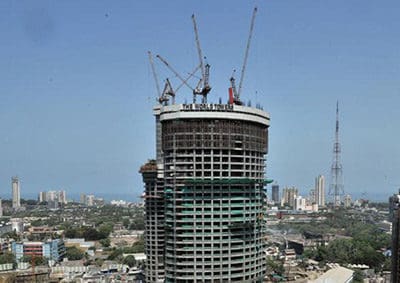
KKR’s three new India deals are all in the Mumbai area
Private equity firm KKR is expanding its real estate investment in India by putting 18 billion Indian rupees (about $262 million) into three projects across greater Mumbai, according to the Economic Times. The firm is said to be investing about rupees 7.5 billion each into projects in Central and South Mumbai, and up to rupees 3 billion into a third project in the lake city of Thane just outside of Mumbai.
The US buyout giant has signed up to finance three separate projects in the Indian financial hub, including a newly launched office development from Lodha Developers in Central Mumbai, according to the local news report. In South Mumbai, the investment is backing an upmarket residential project developed by developer Shapoorji Pallonji. The Thane investment will also be in residential property, this one developed by Paranjpe Scheme Constructions.
The trio of debt deals comes just over one year after KKR finished raising $9.3 billion for its third pan-Asian fund. Contacted by Mingtiandi for comment, representatives of KKR declined to comment on the market report.
US PE Pioneer Part of Growing India Investment Trend

KKR’s partners at Lodha are building the 117-storey World One office tower in Mumbai
The reported commitment by KKR fits into a surge of foreign investment into India’s real estate market this year after a hot 2017 that saw the sector attract $2.6 billion in inbound capital flows, according to a Knight Frank report. In the preceding 12 years, foreign investors put $42 billion into the market, according to JLL, and the agency projects another $58 billion will be invested over the next decade.
“India is a large, growing market and investors want to get exposure primarily because of the growth dynamics of the broader economy and the high equity yields for real estate relative to other global markets,” said Stuart Crow, JLL’s Head of Asia Pacific Capital Markets.
Even before the news of this latest deal, KKR already accounts for more than $1 billion of India’s foreign real estate investment across more than 25 deals by KKR India Asset Finance. This latest reported investment utilizes debt financing, a strategy KKR has been looking into at least since the firm established a debt fund in India six years ago amid rising interest rates.
KKR’s push into India real estate has been spearheaded by Ashish Khandelia, who joined the company in 2013 and reportedly plans to step down to start his own business. The KKR India Asset Finance made its first investment in 2014, spending Rs350 crore on The Address, a luxury residential project in Ghatkopar developed by Mumbai-based Wadhwa Group.
North American Investors Gain Ground

John Pattar joined KKR as head of APAC real estate in May
Foreign investors have become increasingly interested in the India market, especially North American firms. Investments from the US and Canada are second only to Singapore’s commitments to Indian real estate, which have amounted to $3.3 billion through 16 deals, according to Knight Frank.
Blackstone, Brookfield and Canada Pension Plan Investment Board (CPPIB) are all major North American investors in Indian real estate, in addition to KKR. Blackstone has been especially aggressive in buying up office space in India, making it now the country’s largest office space landlord. The New York-based company is reportedly now in talks to acquire an India real estate fund owned by IL&FS Investment Managers Ltd for $525 million, giving it control of 11 portfolios.
GIC, one of Singapore’s largest investors in India, joined KKR and other global investors in January to take a $1.75 billion stake in the Housing Development Finance Corp, India’s largest mortgage lender. GIC has already been involved in four major deals in the last year, most recently acquiring 50 percent of Mumbai-based developer Provenance Land for 10 billion rupees ($147 million).
Debt Financing Used to Avoid Past Mistakes

Stuart Crow, Head of Capital Markets in Asia Pacific for JLL
KKR isn’t the only one taking advantage of debt financing in India. Though India is one of the world’s fastest-growing economies, debt financing has become a preferred means of funding relative to other markets.
Since several residential projects got delayed or abandoned in the early 2010s, investors have shunned equity-based financing, according to Knight Frank. The share of debt among total investments increased between 2014 and 2016.
While debt financing traditionally offers less risk with less favorable returns, representatives from JLL say returns on debt financing remain very attractive in India. This is especially true in the residential sector where they can rival those of equity financing.
“Many global investors groups are wary of making the same mistakes of the past,” Crow said. “There is demand; however, accessing deal flow in any volume is challenging.”
Wariness toward the residential market isn’t shared by everyone, though. Some deals are still getting made by foreign investors. Toronto-based Brookfield Asset Management Inc. is reportedly putting $100 million into residential investments from Hyderabad-based INCOR. By many metrics, the Indian real estate market is too big an opportunity to ignore.
Leave a Reply